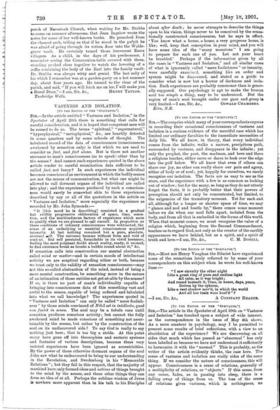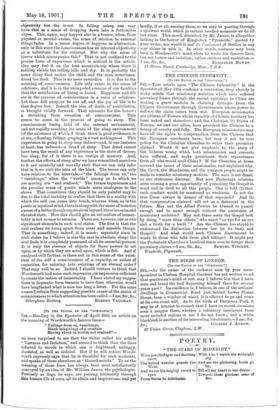[TO TUE EDITOR OF THE Sim,—The article in the Spectator
of April 20th on "Vastness and Isolation" has touched upon a subject of wide interest, as the correspondence in the issue of May 4th shows. As a mere amateur in psychology, may I be permitted to present some results of brief reflections, with a view to an elucidation of the experience? We are discovering on all sides that much which has passed as " abnormal " has only been labelled so because we have not understood it sufficiently to harmonise it with the "normal." This is probably, as the writer of the article evidently thinks, the case here. The sense of vastness and isolation are really sides of the same thing. If we consider the nature of consciousness, this will appear. Consciousness is a sense of relations, generally of a multiplicity of relations, or "objects." If this sense, from any cause, fades, as in passing into sleep, there is a falling away of things from us. The loss of the sense of relations gives vastness, which is nothingness, no objectivity but the is-not. In falling asleep one may have this as a sense of dropping down into a fathomless abyss. This, again, may happen also in a trance, when, from physical or mental causes, the sense of relation to external things fades. In a lesser degree it happens in abstraction, only in this state the consciousness has an internal objectivity as a substitute for the external. But why the sense of horror which accompanies this? That is not confined to the precise form of experience which is noticed in the article. One may feel it on the lone mountain-top where there is nothing visible but rolling hills and sky. It is probably the same thing that makes the child, and the man sometimes, dread the dark. This is no mere cowardice. It is due to the meaning of consciousness. Life only exists in the sense of relations; and it is in the unimpeded exercise of our faculties that the satisfaction of living is found. Happiness and life are in the exercise of consciousness in a sense of relations. Let these fall away, or be cut off, and the joy of life is to that degree lost. Indeed the idea of death, of annihilation, is brought vividly forward. That accounts for the horror; a shrinking from cessation of consciousness. This comes to some in the process of going to sleep. The consciousness losing hold of the external environment, and not rapidly reaching its sense of the sleep environment (of the existence of which I think there is good evidence), is at sea,—floating, falling, groping in a vast nothingness. This experience in going to sleep may induce—and, in one instance at least, has induced—a dread of sleep. That dread cannot have been the result of any experience in the state of dream- less sleep, for of it there is no vestige of memory. And, further, the effects of sleep after we have committed ourselves to it are mentally and morally such that we can only infer that in it we visit the isles of the blest. The terror can only have relation to the intervals,—" the fallings from us," the " vanishing,s," when the " worlds " among or to which we are moving are "not realised." The trance experiences and the peculiar sense of poetic minds seem analogous to the above. That sometimes they should be only painful may be due to the total inability to realise that there is a reality with which the self can come into touch, whereas when, as in the poetic or mystical mind, there is along with the sense of isolation a sense of a better though unperceived beyond, there is a calm and elevated state. How this should give an intimation of immor- tality is not so easy to surmise. There are, however, one or two significant elements in such soul states. The first is that the soul realises its being apart from sense and sensible things. That is something; indeed, it is much; especially since in such states (as I believe is also the case in absolute sleep) the soul finds it is completely possessed of all its essential powers. It is only the absence of objects for those powers to act upon, or by which they are acted upon, which is felt. And if analysed still further, is there not in this sense of the exist- ence of the self a consciousness of a capacity, or rather of capacities, for entering into relations of an eternal order P That may well be so. Indeed, I should venture to think that Wordsworth had some such impression, an impression sufficient to create the notion of immortality. I have stated my sugges- tions in dogmatic form because to have done otherwise would have lengthened what is now too long a letter. For the same reason I refrain from suggesting possible causes of the states of consciousness to which attention has been called.—I am, Sir, &c.,







































 Previous page
Previous page